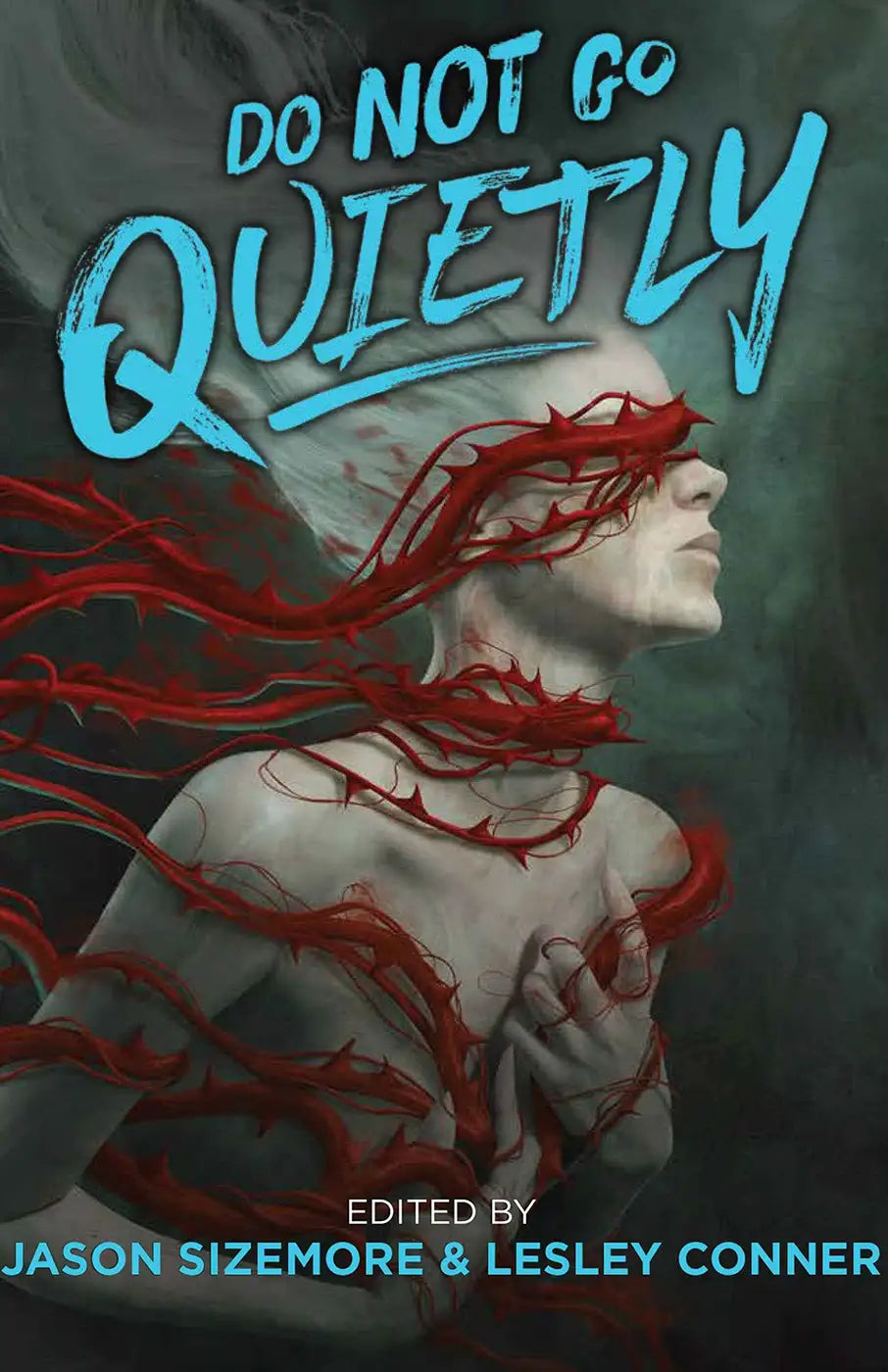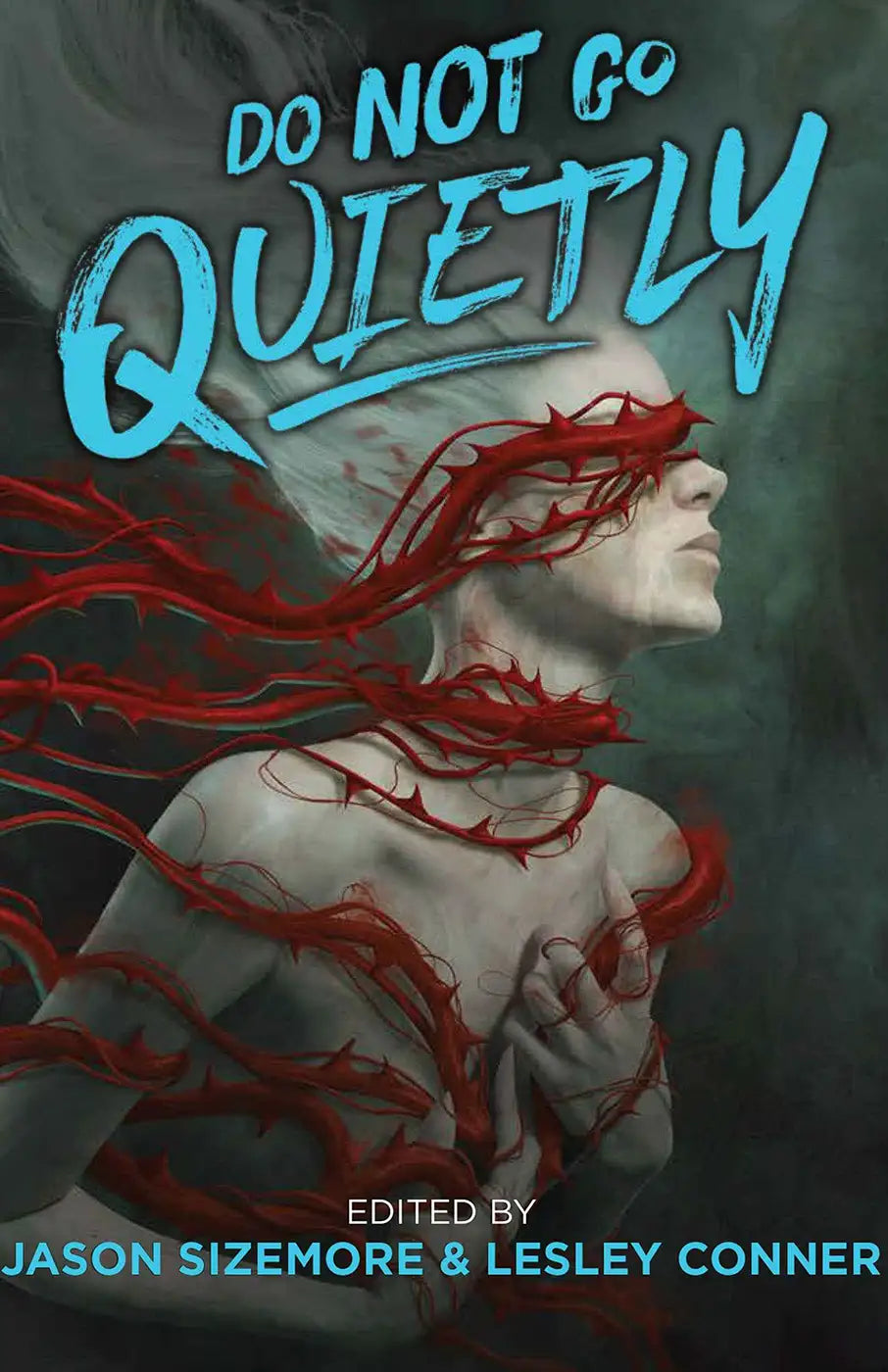Do Not Go Quietly: An Anthology of Victory in Defiance
by Jason Sizemore and Lesley Conner
Cover art by Marcela Bolívar
ISBN 9781937009779
Pp. 340
Disclosure: We are an affiliate of Bookshop.org and will earn a commission if you click through and make a purchase.
From small acts of defiance to protests that shut down cities, Do Not Go Quietly is an anthology of science fiction and fantasy short stories about those who resist. Within this anthology, we will chronicle the fight for what is just and right, and what that means: from leading revolutions to the simple act of saying “No.”
Resistance can be a small act of everyday defiance. And other times, resistance means massive movements that topple governments and become iconic historical moments. Either way, there is power in these acts, and the contributors in Do Not Go Quietly will harness that power to shake our readers to the core. We are subordinates to a power base that is actively working to solidify its grip on the world. Now is the time to stand up and raise your voice and tell the world that enough is enough!
Table of Contents
John Hornor Jacobs - "Glossolalia"
A. Merc Rustad - "The Judith Plague"
Maurice Broaddus/Nayad Monroe - "What the Mountain Wants"
Karin Lowachee - "Sympathizer"
Brooke Bolander - "Kindle"
Cassandra Khaw - "What We Have Chosen to Love"
Fran Wilde - "The Society for the Reclamation of Words and Meaning"
Rich Larson - "Scurry"
Sarah Pinsker - "Everything Is Closed Today"
Sheree Renée Thomas - "Thirteen Year Long Song"
Dee Warrick - "Nobody Lives in the Swamp"
Russell Nichols - "Rage Against the Vending Machine"
Meg Elison - "Hey Alexa"
Marie Vibbert - "South of the Waffle House"
Veronica Brush - "Face"
Jo Miles - "Choose Your Truth"
Rachael K. Jones - "Oil Under Her Tongue"
Eugenia Triantafyllou - "April Teeth"
E. Catherine Tobler - "Kill the Darlings (Silicone Sister Remix)"
Shanna Germain - "Salted Bone and Silent Sea"
POETRY
Annie Neugebauer - "To Write"
Jeremy Paden - "The Skeleton Archer Speaks"
Mary Soon Lee - "If the Fairy Godmother Comes"
Lucy A. Snyder - "Permian Basin Blues"
Christina Sng - "The Dolls"
Joshua Gage - "#greenlivesmatter"
Alethea Kontis - "Witch's Star"
Bianca Spriggs - "Plot Twist"
About the Editors
Jason Sizemore is the son of an unemployed coal miner in a tiny Kentucky Appalachian villa named Big Creek (population 400) where he fought his way out of the hills to the big city of Lexington. He attended Transylvania University (a real school with its own vampire) and received a degree in computer science. Since 2004, he has owned and operated Apex Publications. He is the editor of five anthologies, author of the short story collection Irredeemable and For Exposure: The Life and Times of a Small Press Publisher, a three-time Hugo Award loser, and a freelancer.
Lesley Conner is a writer, social media editor and marketing leader for Apex Publications, and Managing Editor for Apex Magazine. She spends her days pestering book reviewers, proofreading, wrangling slush, doling out contracts, and chatting about books, writing, and anything else that crosses her mind on the @ApexBookCompany Twitter account. Most of her nights are spent with a good book and a glass of wine. Her alternative history horror novel, The Weight of Chains, was recently published by Sinister Grin Press.
Excerpt
From: "To Write" by Annie Neugebauer
Tonight I dreamed
my mouth was zippered shut,
like some macabre doctor
had taken the school teacher's gesture
quite literally
and replaced each lip with one half of a zipper.
Like any fresh surgery,
the flesh ached and burned,
far too tender for me to even think
of touching it with the gentlest fingertips,
much less grasping the metal pull
and opening the angry little teeth.
Share

- Description
- Table of Contents
- About the Editors
- Excerpt
From small acts of defiance to protests that shut down cities, Do Not Go Quietly is an anthology of science fiction and fantasy short stories about those who resist. Within this anthology, we will chronicle the fight for what is just and right, and what that means: from leading revolutions to the simple act of saying “No.”
Resistance can be a small act of everyday defiance. And other times, resistance means massive movements that topple governments and become iconic historical moments. Either way, there is power in these acts, and the contributors in Do Not Go Quietly will harness that power to shake our readers to the core. We are subordinates to a power base that is actively working to solidify its grip on the world. Now is the time to stand up and raise your voice and tell the world that enough is enough!
John Hornor Jacobs - "Glossolalia"
A. Merc Rustad - "The Judith Plague"
Maurice Broaddus/Nayad Monroe - "What the Mountain Wants"
Karin Lowachee - "Sympathizer"
Brooke Bolander - "Kindle"
Cassandra Khaw - "What We Have Chosen to Love"
Fran Wilde - "The Society for the Reclamation of Words and Meaning"
Rich Larson - "Scurry"
Sarah Pinsker - "Everything Is Closed Today"
Sheree Renée Thomas - "Thirteen Year Long Song"
Dee Warrick - "Nobody Lives in the Swamp"
Russell Nichols - "Rage Against the Vending Machine"
Meg Elison - "Hey Alexa"
Marie Vibbert - "South of the Waffle House"
Veronica Brush - "Face"
Jo Miles - "Choose Your Truth"
Rachael K. Jones - "Oil Under Her Tongue"
Eugenia Triantafyllou - "April Teeth"
E. Catherine Tobler - "Kill the Darlings (Silicone Sister Remix)"
Shanna Germain - "Salted Bone and Silent Sea"
POETRY
Annie Neugebauer - "To Write"
Jeremy Paden - "The Skeleton Archer Speaks"
Mary Soon Lee - "If the Fairy Godmother Comes"
Lucy A. Snyder - "Permian Basin Blues"
Christina Sng - "The Dolls"
Joshua Gage - "#greenlivesmatter"
Alethea Kontis - "Witch's Star"
Bianca Spriggs - "Plot Twist"
Jason Sizemore is the son of an unemployed coal miner in a tiny Kentucky Appalachian villa named Big Creek (population 400) where he fought his way out of the hills to the big city of Lexington. He attended Transylvania University (a real school with its own vampire) and received a degree in computer science. Since 2004, he has owned and operated Apex Publications. He is the editor of five anthologies, author of the short story collection Irredeemable and For Exposure: The Life and Times of a Small Press Publisher, a three-time Hugo Award loser, and a freelancer.
Lesley Conner is a writer, social media editor and marketing leader for Apex Publications, and Managing Editor for Apex Magazine. She spends her days pestering book reviewers, proofreading, wrangling slush, doling out contracts, and chatting about books, writing, and anything else that crosses her mind on the @ApexBookCompany Twitter account. Most of her nights are spent with a good book and a glass of wine. Her alternative history horror novel, The Weight of Chains, was recently published by Sinister Grin Press.
From: "To Write" by Annie Neugebauer
Tonight I dreamed
my mouth was zippered shut,
like some macabre doctor
had taken the school teacher's gesture
quite literally
and replaced each lip with one half of a zipper.
Like any fresh surgery,
the flesh ached and burned,
far too tender for me to even think
of touching it with the gentlest fingertips,
much less grasping the metal pull
and opening the angry little teeth.








